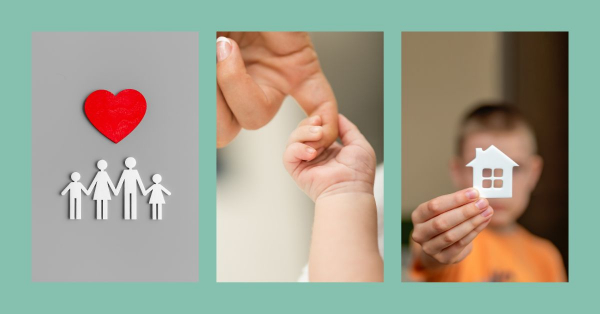When the Honeymoon Is Over
Ah, honeymoons. The first week or so is bliss. You get along, agree on everything, and have the time of your lives. Then, the honeymoon ends and things go back to normal. Except, now you have to learn to get to know one another; to live with one another, share, and adjust to each other’s personalities. The honeymoon is over.
The honeymoon stage exists in foster care and adoption as well as marriage. Honeymoons can bring out the best before reality hits. There are a few reasons for this. But don’t worry. You can overcome this.
Understanding The Honeymoon Period
What is the honeymoon period?
The honeymoon period is a temporary period of bliss and familial harmony with a new placement. Your little one seems happy, is blending in with the other children, and is obeying all of the rules. In the back of your mind, you are saying, “I got this. I don’t know what everyone was so worried about.” Things are going so swimmingly that you start making plans to take in 2, 3, or even 5 more kids.
How long does it last?
There are so many things that go into a honeymoon period; it is difficult to determine how long it might last. It could last anywhere from a couple of days to a couple of weeks, to a few months. Sometimes it happens so suddenly that we are caught off guard. Perhaps something triggers the child into a major meltdown. And then you realize, “This was not the sweet little child who came into my house a few weeks ago.”
Why is there a honeymoon period?
Shock
The circumstances surrounding the reason for the placement of a foster child vary from child to child. However, most children experience a form of shock. Perhaps the police were involved. Perhaps the removal was contentious. Whatever the case, the child may be in shock due to the change of living arrangements, being separated from their siblings, or being separated from their parents. Like the death of a loved one, they are experiencing grief. And like the cycle of grief, after feelings of shock comes anger, then bargaining, then depression, and then finally acceptance.
Misplaced guilt
One of the top issues in working with foster children is one of guilt. Like children of divorce, they may believe they had a hand in their family’s changing dynamics. Foster children may believe if they had been “good,” if they had not disclosed any abuse, or if they had not called the police, they would not be in foster care. These children need to be reassured that it is not their fault that they ended up in foster care and they do not need to change their behavior to return to their family.
Trauma
Many foster and adoptive children have experienced abuse and neglect. Newly placed foster children may try to please their new caregivers in hopes that they will not be abused. Even though children are resilient, they often remember the abuse. And if they do not remember, their body does. Trust is paramount. From an abused child’s point of view, if they couldn’t trust their primary caregiver, why should they trust the next caregiver?
Unrealistic expectations
Sometimes foster and adoptive parents have unrealistic expectations. We think, “This child is the same as my child and therefore, will respond to me in the same ways.” The problem is, our children may not have gone through the same level of trauma that your foster child has and therefore will respond to different things in different ways. Do not compare your foster child. There is no comparison. Meet your foster child where he or she is and learn their needs. You can’t go wrong when you meet the child’s needs.
Prepare Yourself For The End Of The Honeymoon
Be honest with your little one. When your child asks, “When am I going back home?” your response should be, “I don’t know.” The reality is that no one knows. There are so many variables with foster placements. Housing, relapses in treatment, mental health issues, and other factors play into the timeline. So, even responding with, “Soon” may not be accurate. At that point, the child may feel deceived and may start acting out behaviorally. Also, keep in mind that a toddler’s perception of time is different from ours. So, a week may feel as long as a month as far as they are concerned.
Remember your training.
Many foster and adoption agencies are now mandating training. When behaviors increase, you need to go back to your training. Sometimes we throw away the book when training is over. There is some valuable information in that book. Also, keep in touch with your trainer. They may have information that you need.
Manage Expectations
Many new foster/adoptive parents have high expectations. They figure, “I love kids, I have a good home, and I have experience, this should be easy.” But raising kids from hard places is different. It’s ok to have a less-than-perfect family. Your job is not to present a perfect family. Your job is to provide a safe space for a child in need.
Manage Emotions
You may have a roller coaster of emotions with a new placement. You may feel on top of the world one day, and then you may feel like you are sinking on the Titanic the next. Keep calm and provide a safe place for your kiddo. It does no good to meet an out-of-control child and an out-of-control adult. Let them express their emotions, work to keep yours under control. You are not a failure. You are a foster parent. Remember, someone has to be the adult in the room. That would be you.
Be patient
Raising kids in foster care is a marathon, not a sprint. Be patient. You may see three steps forward and two steps back. That’s ok. Persevere and don’t give up.
Celebrate Small Things
Did you have a successful reunification? Celebrate. Did you have an older teen who successfully moved out at 18? Celebrate. Did your foster journey end in an adoption? Celebrate. Or is it something as small as your toddler not having a meltdown all day? Now, it’s really time to celebrate. Celebrate every milestone. Create new milestones. Did nothing important happen today? Celebrate anyway. The celebration is not necessarily rewarding good behavior; rather it is celebrating who the child is as a person. You’re celebrating their worth; their value and their uniqueness.
Foster parenting is not for the faint of heart. It takes thick skin, an open mind, and a willingness to try new things for the benefit of the child. Persevere and don’t give up.






